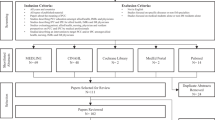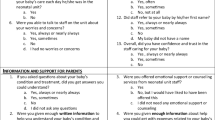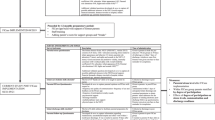Abstract
Objective
This study measured staff understanding and integration of trauma-informed care following comprehensive education.
Study design
This mixed method design used the validated Attitudes Related to Trauma-Informed Care (ARTIC) scale and open-ended survey questions via REDCap optional surveys. Trauma-informed care education was made available to staff members in a level IV NICU. Pre- and post-intervention ARTIC scores were compared and post-intervention REDCap surveys were analyzed.
Result
There were 245 multi-disciplinary NICU team members who completed the ARTIC survey before and/or after the educational intervention; and 764 REDCap surveys were completed throughout the study time. ARTIC scores increased from pre- to post-training both for participants with data at both time points (0.5 SD mean increase) and among those with data at only one time point (0.4 SD mean increase). Content analysis of the REDCap survey corroborated the ARTIC results.
Conclusion
System-wide trauma-informed education can achieve measurable effect in a NICU setting.
This is a preview of subscription content, access via your institution
Access options
Subscribe to this journal
Receive 12 print issues and online access
$259.00 per year
only $21.58 per issue
Buy this article
- Purchase on Springer Link
- Instant access to full article PDF
Prices may be subject to local taxes which are calculated during checkout
Similar content being viewed by others
Data availability
The majority of datasets generated and analyzed during this study are included in this published article [and its supplementary information files]. The complete brainstorming dataset generated and analyzed during the current study are available from the corresponding author on reasonable request.
References
Sanders MR, Hall SL. Trauma-informed care in the newborn intensive care unit: promoting safety, security and connectedness. J Perinatol. 2018;38:3–10.
Montirosso R, Tronick E, Borgatti R. Promoting Neuroprotective Care in Neonatal Intensive Care Units and Preterm Infant Development: Insights From the Neonatal Adequate Care for Quality of Life Study. Child Dev Perspect. 2017;11:9–15.
SAMHSA’s Concept of Trauma and Guidance for a Trauma-Informed Approach. Rockville, MD: Health and Human Services; 2014.
Choi KR, Records K, Low LK, Alhusen JL, Kenner C, Bloch JR, et al. Promotion of Maternal-Infant Mental Health and Trauma-Informed Care During the COVID-19 Pandemic. J Obstet Gynecol Neonatal Nurs. 2020;49:409–15.
Cuevas A. Exploring Four Barriers Experienced by African Americans in Healthcare: Perceived Discrimination, Medical Mistrust, Race Discordance, and Poor Communication. Portland, OR:University PS; 2013.
Raja S, Hasnain M, Hoersch M, Gove-Yin S, Rajagopalan C. Trauma informed care in medicine: current knowledge and future research directions. Fam Community Health. 2015;38:216–26.
Felitti VJ, Anda RF, Nordenberg D, Williamson DF, Spitz AM, Edwards V, et al. Relationship of childhood abuse and household dysfunction to many of the leading causes of death in adults. The Adverse Childhood Experiences (ACE) Study. Am J Prev Med. 1998;14:245–58.
Oh DL, Jerman P, Silverio Marques S, Koita K, Purewal Boparai SK, Burke Harris N, et al. Systematic review of pediatric health outcomes associated with childhood adversity. BMC Pediatr. 2018;18:83.
Matoba N, Collins JW Jr. Racial disparity in infant mortality. Semin Perinatol. 2017;41:354–9.
Shonkoff JP, Garner AS, Committee on Psychosocial Aspects of C, Family H, Committee on Early Childhood A, Dependent C. et al. The lifelong effects of early childhood adversity and toxic stress. Pediatrics. 2012;129:e232–46.
Ravi D, Iacob A, Profit J. Unequal care: Racial/ethnic disparities in neonatal intensive care delivery. Semin Perinatol. 2021;45:151411.
Cerny S, Berg-Poppe P, Anis M, Wesner C, Merrigan M, LaPlante K. Outcomes from an interprofessional curriculum on trauma-informed care among pediatric service providers. J Interprof Care. 2023;37:288–99.
Ashana DC, Lewis C, Hart JL. Dealing with “Difficult” Patients and Families: Making a Case for Trauma-informed Care in the Intensive Care Unit. Ann Am Thorac Soc. 2020;17:541–4.
D’Agata AL, Coughlin M, Sanders MR. Clinician Perceptions of the NICU Infant Experience: Is the NICU Hospitalization Traumatic? Am J Perinatol. 2018;35:1159–67.
Duffee J, Szilagyi M, Forkey H, Kelly ET, Council On Community Pediatrics COFCA, Kinship Care COCA. et al. Trauma-Informed Care in Child Health Systems. Pediatrics. 2021;148:e2021052579.
Weiss D, Kassam-Adams N, Murray C, Kohser KL, Fein JA, Winston FK, et al. Application of a Framework to Implement Trauma-Informed Care Throughout a Pediatric Health Care Network. J Contin Educ Health Prof. 2017;37:55–60.
Marsac ML, Kassam-Adams N, Hildenbrand AK, Nicholls E, Winston FK, Leff SS, et al. Implementing a Trauma-Informed Approach in Pediatric Health Care Networks. JAMA Pediatr. 2016;170:70–7.
Garner A, Yogman M, Committee On Psychosocial Aspects Of C, Family Health SOD, Behavioral Pediatrics COEC. Preventing Childhood Toxic Stress: Partnering With Families and Communities to Promote Relational Health. Pediatrics. 2021;148:e2021052582.
Harris M, Fallot RD. Envisioning a trauma-informed service system: a vital paradigm shift. N Dir Ment Health Serv. 2001;12:3–22.
Green BL, Saunders PA, Power E, Dass-Brailsford P, Schelbert KB, Giller E, et al. Trauma-informed medical care: CME communication training for primary care providers. Fam Med. 2015;47:7–14.
Baker CN, Brown SM, Wilcox PD, Overstreet S, Arora P. Development and Psychometric Evaluation of the Attitudes Related to Trauma-Informed Care (ARTIC) Scale. Sch Ment Health. 2015;8:61–76.
Bloom SL, Farragher B. Restoring Sanctuary: A New Operating System for Trauma-Informed Systems of Care. Oxford: Oxford University Press; 2013.
van Dernoot Lipsky L, Burk C. Trauma stewardship: an everyday guide to caring for self while caring for others. San Francisco, CA: Berrett-Koehler Publishers; 2009.
Browne JV, Jaeger CB, Kenner C, Gravens Consensus Committee on I, Family Centered Developmental C. Executive summary: standards, competencies, and recommended best practices for infant- and family-centered developmental care in the intensive care unit. J Perinatol. 2020;40:5–10.
Coughlin ME. Trauma-Informed Care in the NICU: Evidenced-Based Practice Guidelines for Neonatal Clinicians. New York: Springer Publishing Company; 2016.
Tervalon M, Murray-Garcia J. Cultural humility versus cultural competence: a critical distinction in defining physician training outcomes in multicultural education. J Health Care Poor Underserved. 1998;9:117–25.
Harris PA, Taylor R, Minor BL, Elliott V, Fernandez M, O’Neal L, et al. The REDCap consortium: Building an international community of software platform partners. J Biomed Inf. 2019;95:103208.
Harris PA, Taylor R, Thielke R, Payne J, Gonzalez N, Conde JG. Research electronic data capture (REDCap)–a metadata-driven methodology and workflow process for providing translational research informatics support. J Biomed Inf. 2009;42:377–81.
R Core Team. R: A language and environment for statistical computing. Vienna, Austria: R Foundation for Statistical Computing; 2021.
Saldaña J. The coding manual for qualitative researchers. Thousand Oaks, CA: Sage Publications; 2021.
Creswell JW, Creswell JD. Research design: Qualitative, quantitative, and mixed methods approaches. 6th ed. Thousand Oaks, CA: SAGE Publications, Inc; 2022.
Malouf R, Harrison S, Burton HAL, Gale C, Stein A, Franck LS, et al. Prevalence of anxiety and post-traumatic stress (PTS) among the parents of babies admitted to neonatal units: A systematic review and meta-analysis. EClinicalMedicine. 2022;43:101233.
SAMHSA Administration. Trauma-Informed Care in Behavioral Health Services. Treatment Improvement Protocol (TIP) Series 57. Rockville, MD: U.S. Department of Health and Human Services; 2014.
Davidson JE, Graham P, Montross-Thomas L, Norcross W, Zerbi G. Code Lavender: Cultivating Intentional Acts of Kindness in Response to Stressful Work Situations. Explor. 2017;13:181–5.
Duffy J. Quality Caring in Nursing and Health Systems: Implications for Clinicians, Educators, and Leaders. New York: Springer Publishing Company; 2018.
Hansen K, Davis P, Hubbard DK. Trauma Informed Care in the Neonatal Intensive Care Unit. J Soc Work End Life Palliat Care. 2023;49:1–10.
Acknowledgements
We gratefully acknowledge assistance from study team Clinical Investigators, Grace Asaad, RN, Shelbi Polasik, MT, and Liesel Stephens, MT, who served as scientific advisors by coding and analyzing study participant responses for qualitative data interpretation. We particularly appreciate the assistance of the additional members of the Children’s Mercy Kansas City NICU Trauma-Informed Care workgroup, who served as Participating Investigators aiding in multi-disciplinary collaboration and data collection including Kaylee Hurt, Parent on Staff, Elisa Loughman, MD, Courtney Becker, RN, Becky Palmer, QI, Marni Scott, LCSW, Carissa Thompson, LCSW, Megan Cope, RN, John Lantos, MD, Brooke Ratliff, CLS, Erin Perez, LCSW, Nicole Hutcheson, DNP, Dianne Wilderson, MSN, and Mary Henley, CCRN. We especially valued the assistance of Chris Kennedy, MD, pediatric emergency medicine, Children’s Mercy Kansas City, in helping to create the on-line distribution of the ARTIC survey. The authors would also like to thank the members of the NICU healthcare team members who participated in our study.
Author information
Authors and Affiliations
Contributions
Researchers Davis, Hubbard, Hansen, Nitkin, and Keith-Chancy conceptualized and designed the paper, drafted the initial manuscript, and reviewed and revised the manuscript. Investigator’s Staggs, Carter, Gladdis, Godwin, Ashbaugh, Hardy, and Babbar critically reviewed and revised the manuscript for important intellectual content and data interpretation. All authors approved the final manuscript as submitted and agree to be accountable for all aspects of the work.
Corresponding author
Ethics declarations
Competing interests
The authors declare no competing interests.
Additional information
Publisher’s note Springer Nature remains neutral with regard to jurisdictional claims in published maps and institutional affiliations.
Supplementary information
Rights and permissions
Springer Nature or its licensor (e.g. a society or other partner) holds exclusive rights to this article under a publishing agreement with the author(s) or other rightsholder(s); author self-archiving of the accepted manuscript version of this article is solely governed by the terms of such publishing agreement and applicable law.
About this article
Cite this article
Davis, P.A., Hubbard, D., Gladdis, T. et al. Improving attitudes toward trauma-informed care in the neonatal intensive care unit through comprehensive multi-disciplinary education. J Perinatol (2024). https://doi.org/10.1038/s41372-024-01897-4
Received:
Revised:
Accepted:
Published:
DOI: https://doi.org/10.1038/s41372-024-01897-4



